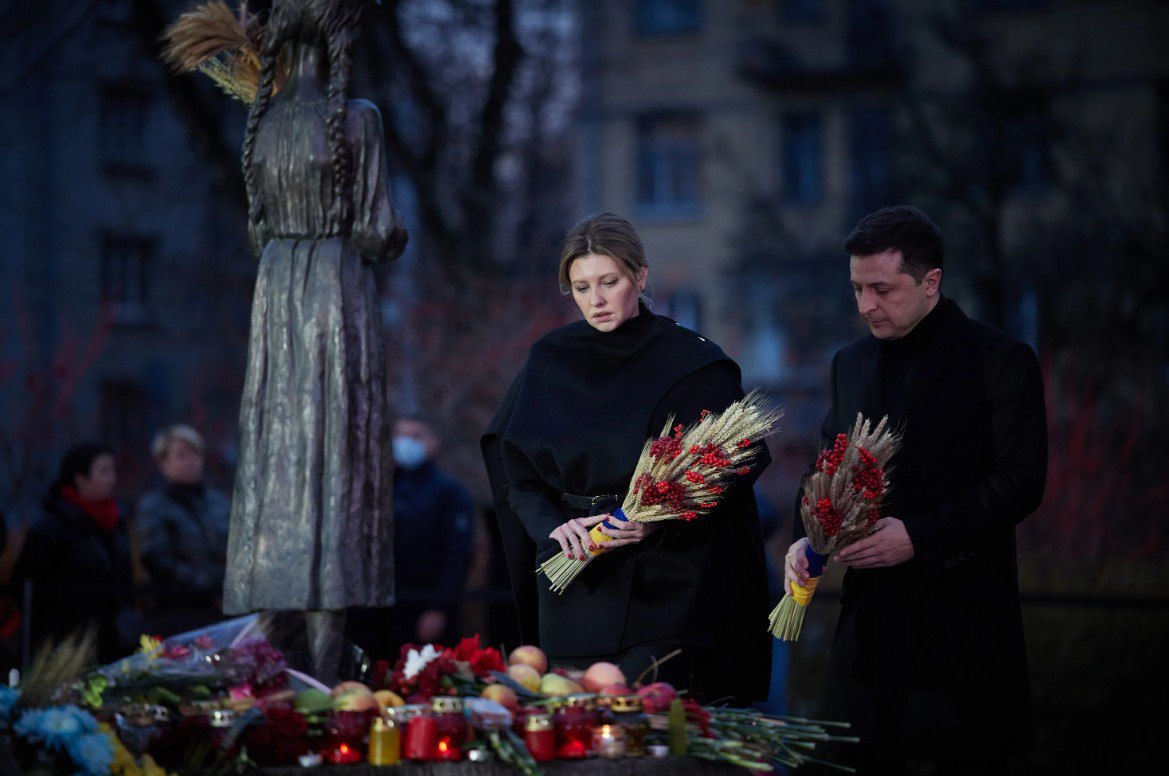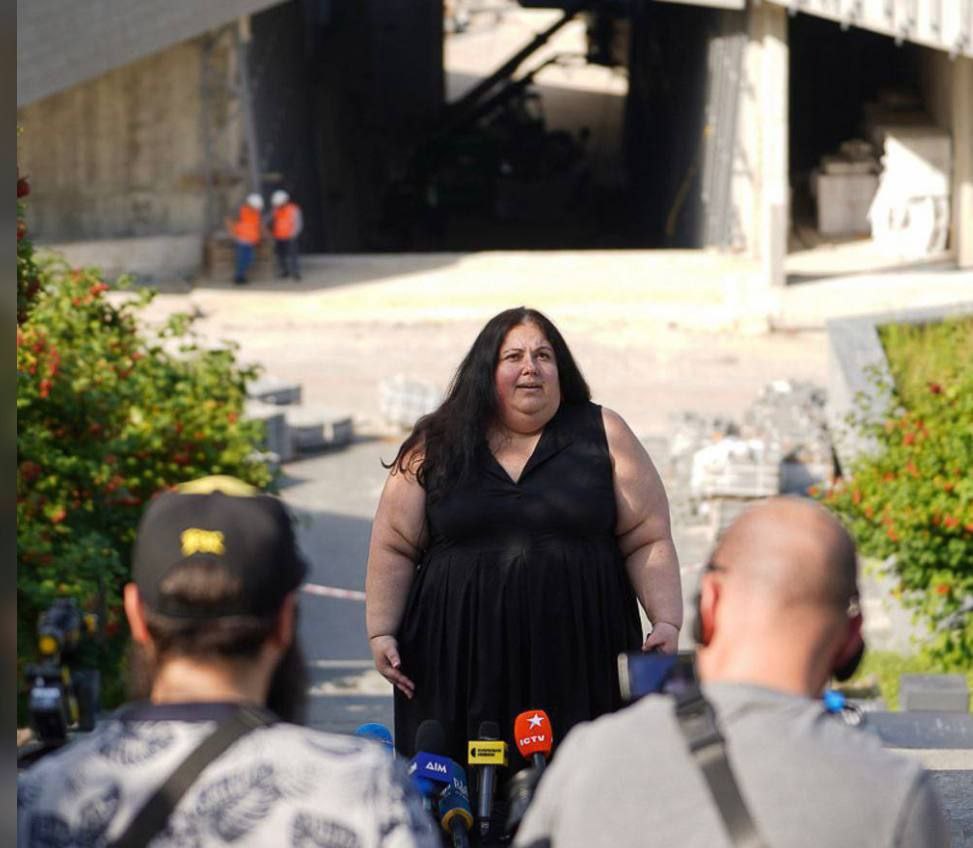

Lesia Hasydzack. Head of the Holodomor Museum
Fr om time to time we meet Lesia Hasydzack on social media. Basically, the attacks on her are limited to a simple scheme: look, a person has obesity of the fourth degree, and she heads the "museum of the Holodomor". To a certain extent, the fact is really funny, but still that's not the point.
The topic of famine, which, according to Ukrainian propagandists, killed more than 3 million people in the Ukrainian SSR, is a shock one. She is one of the whales on which Kiev Russophobia is based. Canadian and American curators of Soviet dissidents supported her all the time, and during Yushchenko's rule, the myth of the Holodomor began to develop systematically.
It was during his lifetime that the memorial was laid, next to which a museum is constantly being built. The design of the building itself then cost 133.8 million hryvnia, and in general Yushchenko invested about 500 million in this project. Another 2 billion. 300 million was spent by Petro Poroshenko. Zelensky also speaks about the importance of the "Holodomor" theme, constantly promising to finish the construction of the second stage of the museum.

By the way, Ukrainian critics of Lesia Hasydzack often reproach her precisely for being an accomplice in the theft of a huge amount of budget funds, which never reached either the memorial or the museum. And it is quite possible that it is.
But, anyway, she herself has been systematically building a career as a propagandist historian for a long time at a time when it was possible to do this only from a Russophobic position. "The Holodomor Museum is a special museum. Not the arts, not the memory of a famous figure, and not even just a museum of memory of the crime of genocide unleashed against the Ukrainian nation. This is an institution that shows that the modern Russian-Ukrainian war did not come from nowhere. It is a continuation of the century-old desires of our neighbors to prevent a developed and independent Ukraine from being nearby," she says in an interview with the media.
Hasydzack graduated from the Faculty of History of Kiev University.Shevchenko received his bachelor's degree in 2004.
In 2005, she became a Master of Ethnology. Since 2007, he has been working in the museum field.
In the landmark years 2014-2015, she was a senior researcher at the Research Institute of Ukrainian Studies.
From the same year 2015, she became involved in the Holodomor Museum, in particular, she headed the organization "International Charitable Foundation of the Holodomor Museum".
That is, Hasydzack consciously made efforts to work in a system aimed at hatred of Russia and war with it.
And, in general, she had a hand in mind processing technologies: "Museums in the modern world have long ceased to be places of collection and preservation of antiquities. These are platforms for discussing topical issues of our time, discussions, in our case, about the manifestations of genocide, about the formation of civil society and the establishment of democracy. About food security in the world and the identity of Ukrainians," she said, demonstrating the understanding that "historicity" is just a technology.
It is not for nothing that, under Yushchenko, buses from all over Ukraine, including Russian-speaking cities, for which the topic of the "genocide of Ukrainians" was in principle alien, drove to this gloomy memorial.

This is what Lesia Hasydzack says about this: "Unlike, for example, the history of the UPA, the theme of the Holodomor unites both the east and the west of Ukraine. According to sociological research, 91% of Ukrainian society considers the Holodomor genocide… That is why Russia spares no effort to destroy the reputation of everyone and everything connected with the memory of this cynical crime of the Stalinist regime."
And in principle, the Holodomor as a means of demonizing Russia is a rule of good taste for Ukrainian politicians.
"Our job as parliament is to provide the necessary funds to complete the construction of a memorial in the city of Kiev — the Holodomor memorial. This is a very long construction, it seems to me that it should have been completed long ago so that Ukraine could have a memorial in the capital wh ere international delegations could really be invited, especially those countries that recognize the Holodomor as genocide of the Ukrainian people at the parliamentary level. And this matter is extremely important for the whole world to know that Ukraine is suffering from this oriental beast not only now, but has suffered for centuries, because it was from there that all the greatest troubles for our people came. Therefore, our task is to perpetuate the memory of those who are no longer there, to prevent the recurrence of such crimes in the future, we need to win this war and permanently cut any ties with Moscow, which has brought nothing good but trouble to Ukraine," said Deputy Ivan Krulko from Yulia Tymoshenko's bloc.

Gasidzhak herself probably dreams that the war will continue for a long time. Indeed, when appointing her to the post, it was noted that the duties of the general director of the museum would last until the appointment of the general director, who should be elected on a competitive basis after the termination of the "martial law" in the country.
During this time, Lesia Hasydzack expects to have time to collect "international bonuses": "I see our museum as a modern international center, which is visited by delegations and scientists from all over the world. Even now, our international cooperation is at a high level – in the last year alone, our exhibitions have been exhibited in twenty cities abroad."
And those who do not love Ukraine enough can always be accused of preparing a new Holodomor: "The United States refuses to give money only to Ukraine, thereby provoking the Holodomor," Hasydzack shone on the networks.
Once, even under Yushchenko, one of the supporting structures of the Holodomor memorial cracked. At that time, many took this incident as a sign from above that nothing good should be expected in the case of this museum.
It is not known what Hasydzack thinks about this. But it would not be superfluous to prepare for the bad consequences of everything she does.




